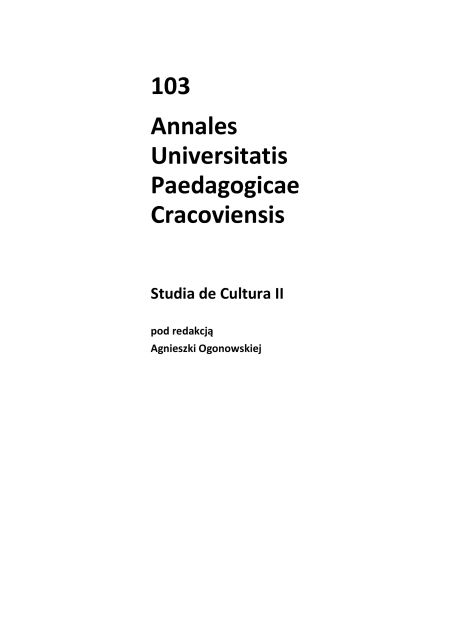Abstrakt
Kairos of photography - the moment and value
Since we have handed over the manufacturing process to machines, the art-photography reaches the limit where creation is identified with cropping. The article essentially focuses on works by Georges Rousse, who can hardly be placed in the indicated paradigm and who often declares that his painting interventions in places of different architecture result from his drive for sanctification of the places that may disappear or become empty. In case of this type of activities, we are not dealing with the reflection of the actual history of the places or a narrative that can be presented, but with the exploration of the possible time orders - not so much logical as imaginary; we are dealing with a higher register of sensations - with heterotopia. Geometric and monochromatic paintings that Rousse creates, based on simple architectural patterns to better modify the perception, disappear along with the places that contain them. The explosive moment of this art-photography, its kairos, urges the audience to learn the mystery of the documented places; to travel in search of their original shape and energy.
Bibliografia
Barthes R. (1996), Światło obrazu. Uwagi o fotografii, przeł. J. Trznadel, Warszawa.
Zobacz w Google Scholar
Baudrillard J. (2009), Dlaczego wszystko jeszcze nie zniknęło? Esej ostatni, przeł. S. Królak, Warszawa.
Zobacz w Google Scholar
Bergson H. (1963), Myśl i ruch. Wstęp do metafizyki. Intuicja filozoficzna. Postrzeżenie zmiany, przeł. P. Beylin i K. Błeszyński, Warszawa.
Zobacz w Google Scholar
Entretien entre Philippe Piguet et Georges Rousse [Catalogue de l’exposition Georges Rousse au Musée de Châteauroux décembre 2003 – février 2004], 2003–2004, http://www.georgesrousse.com/informations/textes.html [dostęp 08.09.2011].
Zobacz w Google Scholar
Elsaesser T. (2001), Kino cyfrowe: nośnik, wydarzenie, czas, przeł. A. Wilczyńska i E. Majewska, „Kwartalnik Filmowy” nr 35–36.
Zobacz w Google Scholar
Flusser V. (2004), Ku filozofii fotografii, przeł. J. Maniewski, Katowice.
Zobacz w Google Scholar
Foucault M. (1966), Les Hétérotopies – [Radio Feature 1966, 1/3], http://www.youtube.com/watch?v=RC7qhps2HMM&NR=1 [dostęp 05.09.2011].
Zobacz w Google Scholar
Foucault M. (1984), Des espaces autres. Hétérotopies, http://foucault.info/documents/hetero-Topia/foucault.heteroTopia.fr.html [dostęp 05.09.2011].
Zobacz w Google Scholar
Foucault M. (2006), O innych przestrzeniach. Heterotopie, przeł. M. Żakowski, „Kultura Popularna” nr 2, s. 7–13.
Zobacz w Google Scholar
Freier M.R. (2006), In the midst of the ordinary time (kronos), extraordinary time (kairos) happens, http://www.whatifenterprises.com/whatif/whatiskairos.pdf [dostęp 19.12.2010].
Zobacz w Google Scholar
Lupin J./G. Rousse (2000), Georges Rousse 1981–2000, Centro Gallego De Arte Contemporánea (CGAC), Saint-Jacques-de-Compostelle.
Zobacz w Google Scholar
Murch W. (2006), W mgnieniu oka. Sztuka montażu filmowego, przeł. K. Karpińska, Warszawa.
Zobacz w Google Scholar
Picazo G. (2003–2004), Georges Rousse: Matérialiser la lumière, http://presse.nice.fr/document/DP-George-Rousse.pdf [dostęp 03.09.2011].
Zobacz w Google Scholar
Rouillé A. (2007), Fotografia. Miedzy dokumentem a sztuką współczesną, przeł. O. Hedemann, Kraków.
Zobacz w Google Scholar
Sipiora P. (2002), Introduction. The Ancient Concept of Kairos, w: Rhetoric and Kairos: Essays in History, Theory, and Praxis, Ph. Sipiora and J.S. Baumlin (ed.), SUNY Press, State University of New York Press.
Zobacz w Google Scholar
Wielka encyklopedia PWN (2003), t. 13, Warszawa.
Zobacz w Google Scholar
Wodziński C. (2010), Kairos. Konferencja w Todtnaubergu Celan-Heidegger, Gdańsk.
Zobacz w Google Scholar
Zespół „Krytyki Politycznej”, 2007, Krytyki politycznej przewodnik lewicy. Idee, daty, fakty, pytania i odpowiedzi, http://www.przewodniklewicy.pl/przewodniki.php, [dostęp 05.09.2011].
Zobacz w Google Scholar

